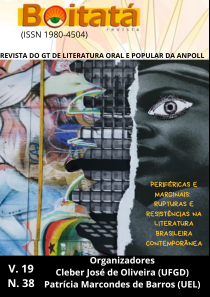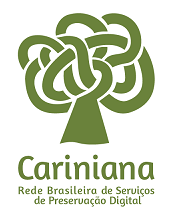Clay chronicles and contours of the peripheral place in Criolo and Sérgio Vaz
DOI:
https://doi.org/10.5433/boitata.2024v19.e50406Keywords:
Brazilian literature, contemporary poetics, the place on the peripheryAbstract
The objective of the article is to analyze the peripheral place in Criolo's voices in the song "Não existe amor em SP" in dialogue with the book that touches on the verses "Literatura, pão e poesia: história de um povo lindo e inteligente", by Sérgio Vaz, with emphasis on the chronicle "Mil graus na terra da garoa". Putting emphasis on the writing interspersed with the verses produced by Vaz, memory emerges no less poetically in chronicles, which fertilize a self already known from and in the outskirts of São Paulo that reverberates, especially, in the spaces of the community and school in poetry workshops and soirées; flirting with another urban poet, who, beyond words, shares the rhythm and cadence of surviving in marginalized spaces, Criolo; and both guide the methodology of critical analysis of literary-song productions to which we focus our gaze. Such dialogues are examples of artistic hybridity that occur through language, the material for the realization of thought, and can be understood through the theoretical-critical contributions of Paulo Leminski (2011), when he reflects on the pleasure of language, while Charles A. Perrone ( 2008) contextualizes Brazilian song in interface with the poetic language conceived by Octavio Paz (2012), reflecting the sociological nuances in the words of Heloisa Buarque de Holanda (2020) about the limits of the periphery. Anchored in these biases, we recognize the authors, their voices and echoes of (r)existence in the projection of places that were environments of birth, identity and struggle of invisible bodies, in the ambivalence of the language that resizes the place in exchange with the urban center and its contours, which make poetry sustainable food for subjects impoverished by society.
Downloads
References
AYALA, M. I. Riqueza de pobre e o conto popular: um fazer dentro da vida. Maricá: Ponto da Cultura, 2011.
BACHELARD, G. A poética do espaço. São Paulo: WMF Martins, 2008.
BRUM, E. Posfácio. In: VAZ, S. Literatura, pão e poesia: histórias de um povo lindo e inteligente. 2. ed. São Paulo: Global Editora, 2020.
CASTELLO, J. Crônica, um gênero brasileiro. Curitiba: Rascunho, 2007.
CRIOLO. Criolo se reinventa em sobre viver: "canto o abismo social que a gente vive" [exclusiva]. [Entrevista cedida a] Eduardo do Valle. Rolling Stone, São Paulo, 7 maio 2022. Disponível em: https://rollingstone.com.br/musica/criolo-se-reinventa-em-sobre-viver-canto-o-abismo-social-que-gente-vive/. Acesso em: abr. 2024.
DUFRENNE, M. O poético. São Paulo: Globo, 1969.
GULLAR, F. Cadernos de literatura brasileira. São Paulo: IMS, 2011.
HILST, H. Júbilo, memória, noviciado da paixão. São Paulo: Globo, 2008.
HOLANDA, H. B. de. Caminhos de um poeta cidadão. In: VAZ, S. Literatura, pão e poesia: histórias de um povo lindo e inteligente. 2. ed. São Paulo: Global Editora, 2020.
LEMINSKI, P. Ensaios e anseios crípticos. Campinas: Editora da Unicamp, 2011.
MEIRELES, C. Antologia poética. 3. ed. São Paulo: Global Editora, 2013.
NÃO existe amor em SP. [Compositor e intérprete]: CRIOLO. In: NÓ na orelha. [Compositor e intérprete]: CRIOLO. São Paulo: Oloko, 2011. 1 CD. Faixa 3.
OLIVEIRA, R. P. de. Literatura marginal: questionamentos à teoria literária. Ipotesi, Juiz de Fora, v. 15, n. 2, p. 31-39, jul./dez. 2011. Disponível em: https://pt.scribd.com/document/205165649/Oliveira-Rejane-Literatura-Marginal-Questionamentos-a-Teoria-Literaria-pdf. Acesso em: abr. 2024.
PAZ, O. O arco e a lira. São Paulo: Cosac&Naify, 2012.
PERRONE, C. A. Letras e letras da MPB. 2. ed. São Paulo: Booklink, 2008. Disponível em: https://people.clas.ufl.edu/perrone/files/Letras_e_letras_da_MPB-Academia.pdf. Acesso em: abr. 2024
PERRONE-MOISÉS, L. Mutações da literatura no século XXI. São Paulo: Companhia das Letras, 2016.
POUND, E. Abc da literatura. São Paulo: Editora Cultrix, 2003.
TODOROV, T. A literatura em perigo. São Paulo: Difel, 2008.
VAZ, S. Literatura, pão e poesia: história de um povo lindo e inteligente. 2. ed. São Paulo: Global Editora, 2020.
VAZ, S. Sérgio Vaz: "poesia para mim é quando ela desce do pedestal e beija os pés da comunidade". [Entrevista cedida a] Katia Marko e Fabiana Reinholz. Brasil de Fato, São Paulo, 10 nov. 2021. Disponível em: https://www.brasildefato.com.br/2021/11/10/sergio-vaz-poesia-para-mim-e-quando-ela-desce-do-pedestal-e-beija-os-pes-da-comunidade. Acesso em: abr. 2024.
Downloads
Published
How to Cite
Issue
Section
License
Copyright (c) 2024 João Paulo Fernandes

This work is licensed under a Creative Commons Attribution 4.0 International License.
Boitatá esta licenciada com CC BY sob essa licença é possível: Compartilhar - copiar e redistribuir o material em qualquer suporte ou formato. Adaptar - remixar, transformar, e criar a partir do material, atribuindo o devido crédito e prover um link para a licença e indicar se mudanças foram feitas.






















